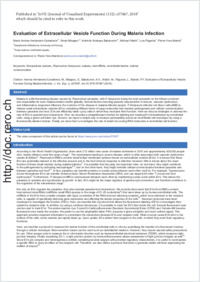Evaluation of extracellular vesicle function during malaria infection
- Andrea Hernández-Castañeda, María University of Fribourg
- Mbagwu, Smart Ikechukwu University of Fribourg
- Babatunde, Kehinde Adebayo University of Fribourg
- Walch, Michael University of Fribourg
- Filgueira, Luis University of Fribourg
- Mantel, Pierre-Yves University of Fribourg
-
14.02.2018
Published in:
- JoVE (Journal of Visualized Experiments). - 2018, no. 132, p. e57067
Extracellular vesicles
Plasmodium falciparum
Malaria
microRNAs
Endothelial barrier
Cellular communication
English
Malaria is a life-threatening disease caused by Plasmodium parasites, with P. falciparum being the most prevalent on the African continent and responsible for most malaria-related deaths globally. Several factors including parasite sequestration in tissues, vascular dysfunction, and inflammatory responses influence the evolution of the disease in malaria-infected people. P. falciparum-infected red blood cells (iRBCs) release small extracellular vesicles (EVs) containing different kinds of cargo molecules that mediate pathogenesis and cellular communication between parasites and host. EVs are efficiently taken up by cells in which they modulate their function. Here we discuss strategies to address the role of EVs in parasite-host interactions. First, we describe a straightforward method for labeling and tracking EV internalization by endothelial cells, using a green cell linker dye. Second, we report a simple way to measure permeability across an endothelial cell monolayer by using a fluorescently labeled dextran. Finally, we show how to investigate the role of small non-coding RNA molecules in endothelial cell function.
- Faculty
- Faculté des sciences et de médecine
- Department
- Département de Médecine
- Language
-
- English
- Classification
- Biological sciences
- License
- License undefined
- Identifiers
-
- RERO DOC 323924
- DOI 10.3791/57067
- Persistent URL
- https://folia.unifr.ch/unifr/documents/307296
Statistics
Document views: 86
File downloads:
- fil_eev.pdf: 222
